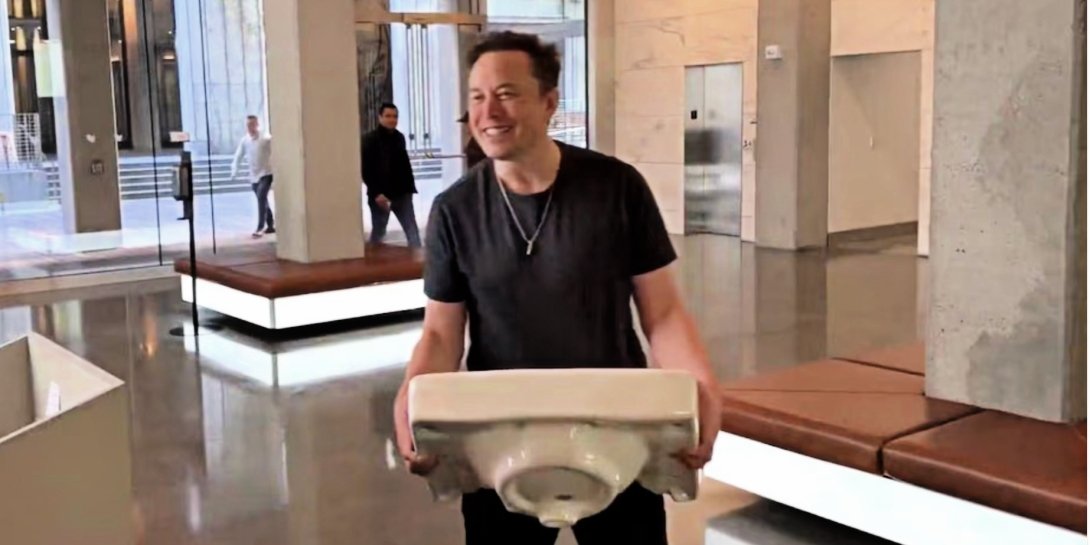Sink, Sank, Sunk: One Year in and Musk's Twitter Is Circling the Drain

Video screenshot
It’s been one year since Elon Musk took ownership of Twitter and proceeded to strip it of all its social value.
Let that sink in. When he took charge of the platform, Musk called Twitter the internet’s “de facto town square.” Under his leadership, Musk insisted, the online forum would become “important to the future of civilization.” Very few people believed him at the time. Far fewer do now.
Twitter on Oct. 27, 2023, is a lot worse than it was on Oct. 27, 2022, when Musk carried a porcelain sink into the company’s San Francisco headquarters. (Get it? Me neither.) As it turns out, the joke’s on Musk, on the banks that helped him finance this disastrous deal, and on anyone else who still believes he cares about protecting free speech and facilitating civil discourse online.
And Musk’s biggest failings over a year of catastrophic decisions occurred during the very first days of his tenure, when he abandoned an early commitment to the sort of content moderation that makes civil discourse possible … and social-media enterprises successful.
Musk’s biggest mistake
Within a week of taking over, Musk met with civil-rights leaders, including Free Press Co-CEO Jessica J. González. He pledged to “combat hate and harassment” on the network and “enforce [Twitter’s] election integrity policies.” But soon after this meeting, Musk announced sweeping layoffs, firing a large percentage of Twitter employees, including many of those responsible for upholding the company’s critical brand-safety, election-integrity and content-moderation standards.
Things quickly went downhill from there.
Free Press and our allies launched the #StopToxicTwitter coalition soon after Musk reneged on his pledge to combat the spread of hate and disinformation. We urged the platform’s top advertisers to pause all placements on Twitter until they received assurances that Musk would safeguard their brands. Advertisers left Twitter in droves: Within three months of the launch of #StopToxicTwitter, more than 500 advertisers stopped their Twitter spending, sending a powerful message to Musk that they would not bankroll the unchecked spread of hate and disinformation. The advertiser exodus, which continued through the year, is a major contributor to the precipitous drop in revenue at Twitter.
Earlier this month, the marketing firm Ebiquity reported that only two of its clients (which include 70 of the top-100 advertising brands in the United States) are now spending on Twitter — down from 31 the month before Musk took control. This aligns with Musk’s own assessment, made last month, that U.S. advertising revenue has sunk 60 percent since he acquired the company.
Instead of meeting advertiser and advocate demands for a safer and more civil public forum, Musk has responded by suing a research organization and #StopToxicTwitter partner — the Center for Countering Digital Hate — that has documented the increased spread of vitriol and lies across his network. He also threatened to sue another organization that had led criticism about the dramatic rise in antisemitic content on Twitter over the last year.
Musk’s decision to grant a “general amnesty” to thousands of previously banned accounts, including those belonging to vile neo-Nazis, white supremacists and conspiracy theorists, has further kept advertisers at bay. More recently, he’s used his blue-check, pay-for-engagement scheme to give a soapbox (and even revenues) to all sorts of grifters and propagandists, including many people seeking to drown legitimate public discourse about the Israel/Gaza crisis in lies.
The person who’s most to blame
In Musk’s distorted worldview, his critics are to blame for Twitter’s sinking fortunes. On top of that, this self-proclaimed “free-speech absolutist” has used his considerable resources to silence anyone who disagrees with him.
“That the wealthiest man on the planet is using his money, influence and even legal action to threaten and silence critics, including our coalition partners, is reprehensible,” Jessica J. González said. “Musk bought an advertising platform and advertisers have made themselves clear: They want no part of the toxic stew of hate and lies that Musk has enabled. The only one Musk has to blame for X’s declining fortunes is himself.”
Through it all Musk has chosen to ignore a fundamental truth for social-media ventures: Effective content moderation is essential to growing healthy online communities and company revenues. As Musk’s Twitter circles the drain toward insolvency, he has repeatedly demonstrated this lack of basic business smarts about online platforms.
“It’s kind of a rite of passage for any new social media network,” Mike Masnick wrote about the content-moderation learning curve. “They show up, insist that they’re the ‘platform for free speech’ without quite understanding what that actually means, and then they quickly discover a whole bunch of fairly fundamental ideas, institute a bunch of rapid (often sloppy) changes … and in the end, they basically all end up in the same general vicinity.”
Musk has yet to arrive there and after a year of failures he likely never will. The proof for Twitter is in its bottom line. The advertisers that have left Twitter have put their money where their values are. And they aren’t likely to return in any significant way unless and until Twitter can make assurances that their brands aren’t underwriting the amplification of hate and lies.
We hoped Musk would have learned this lesson at the beginning: Twitter’s business will live or die on the decisions he makes or doesn’t make about content moderation.
But one year after Musk carried a sink through Twitter’s front door, all of his decisions have been wrong, with consequences that continue to undermine free speech, imperil democracy, and harm people both at home and abroad.